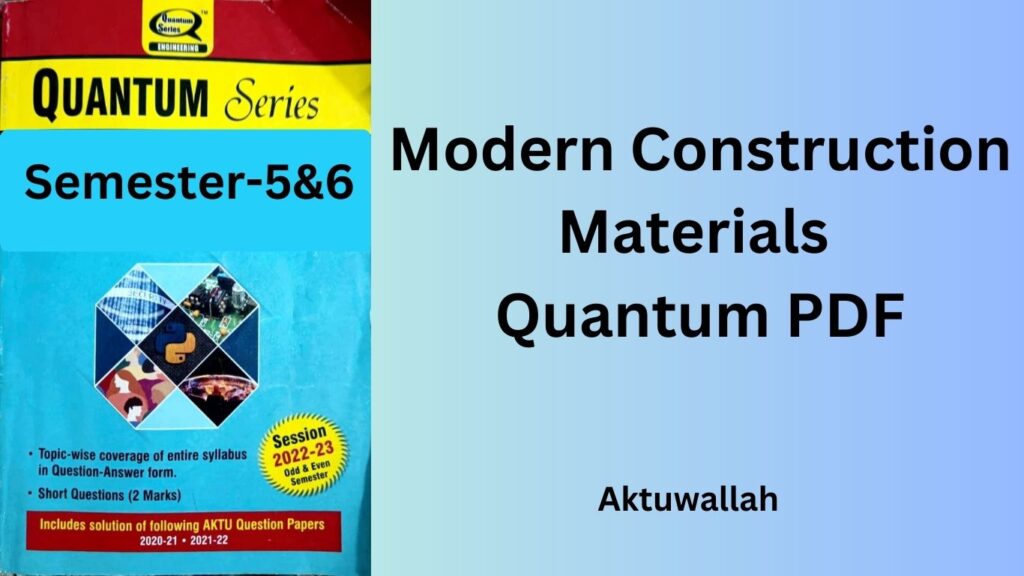Modern Construction Materials Quantum PDF For AKTU B-tech 3rd Year Civil Engineering:
Modern construction materials have revolutionized the field of civil engineering, offering innovative solutions that enhance the durability, sustainability, and efficiency of structures. For AKTU B-Tech 3rd year civil engineering students, understanding these materials and their key topics is crucial to excel in their academic journey and future careers. In this article, we will delve into the world of modern construction materials, providing a downloadable PDF of modern construction materials quantum and exploring key topics that every student should grasp.
How to Assess Modern Construction Materials Quantum PDF for free?
Just click on the given link to get your file,
Download Now.
Download Other Civil Engineering quantum PDF for Aktu B-tech 3rd year: Click Here
Download Syllabus of Modern Construction Materials B-tech 3rd year: Click Here
Download Handwritten Notes of all subjects: Click Here
Download Modern Construction Materials PYQs: Click Here
Key topics covered in this Modern Construction Materials Quantum PDF:
Table of Contents
- Introduction to Modern Construction Materials Quantum PDF
- Advantages of Using Modern Construction Materials
- Concrete Innovations: High-Performance and Self-Healing Concrete
- Green Building Materials: Sustainable Solutions for the Future
- Lightweight Materials: Enhancing Structural Strength and Efficiency
- Smart Materials and Their Role in Construction
- Nanotechnology in Construction: Small Particles, Big Impact
- Composite Materials: Balancing Strength and Weight
- Innovations in Steel and Metal Alloys
- Timber and Alternative Wood-Based Materials
- Innovative Insulation Materials for Enhanced Energy Efficiency
- Understanding Geopolymers and Their Applications
- 3D Printing in Construction: Building the Future Layer by Layer
- Exploring Modern Waterproofing Solutions
- Conclusion: Embracing the Future of Construction Materials
Introduction to Modern Construction Materials Quantum PDF
In the dynamic field of civil engineering, the utilization of modern construction materials quantum has paved the way for revolutionary advancements in building design and construction methodologies. These materials offer an array of benefits, from increased structural integrity to reduced environmental impact.
Advantages of Using Modern Construction Materials
Modern construction materials bring a plethora of advantages. They enhance the durability and longevity of structures, reduce maintenance costs, and often contribute to sustainable building practices. With the integration of these materials, civil engineers can achieve higher levels of innovation and creativity in their projects.
Concrete Innovations: High-Performance and Self-Healing Concrete
Concrete, a staple in construction, has evolved remarkably. High-performance concrete offers exceptional strength and durability, making it suitable for demanding applications. Additionally, self-healing concrete has the ability to repair cracks autonomously, prolonging the lifespan of structures.
Green Building Materials: Sustainable Solutions for the Future
Sustainability is a key focus in modern construction. Green building materials, such as recycled steel and bamboo, contribute to environmentally friendly construction practices. These materials reduce carbon footprint and promote eco-conscious designs.
Lightweight Materials: Enhancing Structural Strength and Efficiency
Lightweight construction materials, like aerated concrete and cellular plastics, have gained popularity due to their ability to reduce dead loads on structures. They maintain structural integrity while minimizing overall weight.
Smart Materials and Their Role in Construction
Smart materials respond to external stimuli, such as temperature changes or stress. In construction, they can adapt to varying conditions, enhancing safety and performance. Shape-memory alloys and self-sensing concrete are examples of these innovative materials.
Nanotechnology in Construction: Small Particles, Big Impact
Nanotechnology has made its mark in construction. Nanomaterials offer improved properties at the nanoscale level, leading to stronger and more durable structures. Their use in concrete and coatings revolutionizes material performance.
Composite Materials: Balancing Strength and Weight
Composite materials combine different substances to achieve optimal properties. Fiber-reinforced polymers (FRPs) are widely used in civil engineering for their high strength-to-weight ratio. They find applications in bridge construction and seismic retrofitting.
Innovations in Steel and Metal Alloys
Steel remains a fundamental construction material. Innovations such as high-strength steel and corrosion-resistant alloys enhance its performance, enabling engineers to design structures that withstand extreme conditions.
Timber and Alternative Wood-Based Materials
Wood has been reimagined for modern construction. Engineered wood products, like cross-laminated timber (CLT), offer the strength of traditional wood with added durability. These materials promote sustainable construction practices.
Innovative Insulation Materials for Enhanced Energy Efficiency
Insulation is vital for energy-efficient buildings. Modern insulation materials, including aerogels and vacuum insulation panels, provide superior thermal performance without adding bulk to walls.
Understanding Geopolymers and Their Applications
Geopolymers are alternatives to traditional cement. These inorganic polymers offer exceptional chemical and thermal resistance, making them suitable for applications in harsh environments and specialized projects.
3D Printing in Construction: Building the Future Layer by Layer
3D printing has introduced groundbreaking possibilities in construction. This technology allows for precise and rapid fabrication of complex structures, reducing material wastage and labor costs.
Exploring Modern Waterproofing Solutions
Waterproofing is essential to protect structures from moisture damage. Innovative waterproofing materials, such as crystalline waterproofing and hydrophobic coatings, ensure long-term structural integrity.
Conclusion: Embracing the Future of Construction Materials
In the ever-evolving realm of civil engineering, embracing modern construction materials is essential. These materials empower engineers to push boundaries, create sustainable designs, and construct resilient structures that stand the test of time.
1 thought on “Modern Construction Materials Quantum PDF”